The Brownsteins in the Land of Israel
Chapter 23:
August
4, 2005
This
summer I was attacked on a Paris subway car -- verbally, religiously and, yes,
physically.
My
life is a study of contrasts and ironies.
I suppose everyone feels that way about himself, but I can speak only
for my own heretofore-fortuitous life. I
am moderately dyslexic, yet I created the largest transcription company of its
kind; I am a small-town kid who thrived in the big world of Los Angeles; and I
became increasingly religious and observant while meeting the needs of the
notoriously immoral entertainment industry.
But the greatest irony in my life is that I married a French woman.
I
was raised in Portland by classic liberal parents who went out of their way to
fight bigotry and hatred. Yet I
can remember more than one occasion when my father -- the paragon of an ACLU (ADL)
Jew, with all the accoutrements -- said without reservation that the French
were, to be polite, at the bottom of his list of civilized people.
My father, who never dwelled on the Holocaust and had no relatives who
suffered at the hands of the Nazis, held an unceasing grudge against our
"allies" the French for their vile actions against the Jews during
that terrible time. He also
voiced his opinion, which is not exclusively his, that the French are rude to
the point of being nasty. But I
believe the latter sentiment was only a by-product of his contempt for French
behavior during the War.
These
almost genetically transmitted thoughts simmered within me all my life, but
came to a head the moment I met my wife-to-be, 14 years ago at a bris in Bel
Air. Obviously, Sara (Patricia at
the time) was not one of "those" French.
She was Jewish and her family had emigrated from Tunisia just a few
years before she was born. Her
family were, and are, no more French than I am an Angeleno.
But with my years of indoctrination against the French, having never
divested myself of a scintilla of the disgust that my father imbued in me,
those negative feelings survived even the Bel Air Bris.

 During my first visit to Europe -- just after we
became engaged -- I spent a few
days in Paris getting to know my new family-to-be.
I made a point of not patronizing the famous Parisian museums,
monuments, and cafés. Instead,
Sara and I almost immediately set out by train to visit Dachau
and Terezienstadt.
From this example of my strong-headedness
my wife speaks in equally loathing and admiring terms of my contempt
for everything French (except the kosher wine).
She acknowledges in her heart the historic French national
anti-Semitism and cowardice (as I am keenly aware of American jingoism, being
an intermittent practitioner), but it is still difficult to distance oneself
emotionally from one’s birth country, whether it be Russia, Ethiopia,
or…France.
During my first visit to Europe -- just after we
became engaged -- I spent a few
days in Paris getting to know my new family-to-be.
I made a point of not patronizing the famous Parisian museums,
monuments, and cafés. Instead,
Sara and I almost immediately set out by train to visit Dachau
and Terezienstadt.
From this example of my strong-headedness
my wife speaks in equally loathing and admiring terms of my contempt
for everything French (except the kosher wine).
She acknowledges in her heart the historic French national
anti-Semitism and cowardice (as I am keenly aware of American jingoism, being
an intermittent practitioner), but it is still difficult to distance oneself
emotionally from one’s birth country, whether it be Russia, Ethiopia,
or…France.
Like many Americans, I believed that French Jewry had all but disappeared
in the Holocaust. Within seconds
of (patronizingly, probably) expressing my admiration to my future in-laws for
having courageously re-populated France with Jews, I was made aware in no
uncertain terms that Paris is not just another big European city with a
handful of Jews; to the contrary, Paris is a bustling Jewish center with a
hundred kosher restaurants, Jews in every quarter, and 27 Jewish day schools.
Today France has the third-largest
Jewish population in the world, after America and Israel.
And Paris, with its 350,000 Jews (some say half a million), is the fourth-largest
Jewish city in the world, after New York, Miami, and Los Angeles.
I also learned that 90% of French Jews immigrated since the mid-1950s
from North Africa (Tunisia, Algeria, and Morocco) because they had been given
automatic French citizenship by Napoleon in the 1800s in his attempt to divide
the local populations. Finally, I
learned that most of those 90% were, in one way or another, related to my
future wife's family and would all be invited to the wedding eight months
hence. I have visited France more
times than I have gone home to Portland.
And never in all my visits have I ever confused the French Jews with
the French -- and never have I felt comfortable there.
As
with everything else that has to do with the French, their Jews are an enigma.
It's too easy, like making stupid beret or baguette jokes, to point out
that French Jews are more French than they are Jewish.
I was about to entitle this piece "The Next Maranos".
But it became apparent that nothing I could say about any perceived
French Jewish cowardice would survive inspection, especially when compared to
the usual benchmark of American Jewry. Yes,
it's true that when I walk into a French electronics store that has a mezuzah
on the door, I am more likely to be shunned for endangering than patronizing
the establishment. And yes, it's
true that the only people who appreciated my yarmulke in France were the
Chabbadniks whom we bumped into at a French amusement park and who thanked me
for openly wearing it.
You
might think, after everything I have written, that these are just stupid sheep
being led to slaughter. But the
fact is that not only on a per capita basis but also on a real basis, many more French Jews make aliyah than do American Jews.
While only about 2,500 of America’s 6 million Jews will make aliyah
this year, 3,300
of France's 600,000 Jews in 2005 will commit themselves to live in the Jewish
homeland. But the story does
not end there. While only about 15%
of American Jews consider themselves to be "Orthodox", nearly
50% the French Jews consider themselves "Orthodox".
So who are the Maranos?
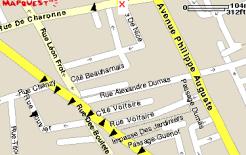
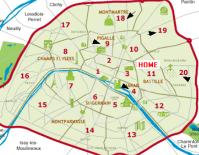 As but one last example of the French Jewish
riddle, Paris contains many more Jewish
neighborhoods than does Los Angeles, for example. (See arrows on left map.)
My in-laws, however, reside in a non-Jewish area called "The
Bastille". Nonetheless,
within easy walking distance in their not-necessarily-Jewish neighborhood one
can pick up provisions from many strictly kosher bakeries, butchers, and
markets -- including one a half a block from my in-laws’ apartment. (See
arrows on right map that indicate the kosher businesses I casually identified
and can remember.) Kosher
restaurants, too, abound. Yet,
sticking with the theme, although each of these businesses is clearly
identified as "cacher" (kosher), each with a mezuzah and a large
certificate from the Paris Rabbinate, it is virtually impossible to find an
employee, owner, or patron wearing a yarmulke.
By contrast, if I were to walk into a fancy kosher restaurant in Los
Angeles and not see a yarmulke on the owner's head, I would be stunned.
On the other hand, it is impossible to ignore the basic fact that the
number of explicitly kosher businesses in this non-Jewish neighborhood of
Paris rivals the density of explicitly kosher shops in Pico-Robertson.
Maranos these are not.
As but one last example of the French Jewish
riddle, Paris contains many more Jewish
neighborhoods than does Los Angeles, for example. (See arrows on left map.)
My in-laws, however, reside in a non-Jewish area called "The
Bastille". Nonetheless,
within easy walking distance in their not-necessarily-Jewish neighborhood one
can pick up provisions from many strictly kosher bakeries, butchers, and
markets -- including one a half a block from my in-laws’ apartment. (See
arrows on right map that indicate the kosher businesses I casually identified
and can remember.) Kosher
restaurants, too, abound. Yet,
sticking with the theme, although each of these businesses is clearly
identified as "cacher" (kosher), each with a mezuzah and a large
certificate from the Paris Rabbinate, it is virtually impossible to find an
employee, owner, or patron wearing a yarmulke.
By contrast, if I were to walk into a fancy kosher restaurant in Los
Angeles and not see a yarmulke on the owner's head, I would be stunned.
On the other hand, it is impossible to ignore the basic fact that the
number of explicitly kosher businesses in this non-Jewish neighborhood of
Paris rivals the density of explicitly kosher shops in Pico-Robertson.
Maranos these are not.
Finally,
even the French Jewish reaction to Prime Minister Ariel Sharon's 2004 call
for immediate French aliyah was bizarre.
Sharon had declared, rightly, "If I have to advise our brothers in
France, I’ll tell them one thing — move to Israel, as early as possible. I
say that to Jews all around the world, but there, I think it’s a must and
they have to move immediately." How
anyone could be surprised by an Israeli Prime Minister urging aliyah is akin
to being flabbergasted when Wisconsin markets cheese.
Nonetheless, one could expect the immediate overreaction of French
President Jacques Chirac when he wrote, " Further, Jean-Louis Debre, the
president of the National Assembly, said "These words are inadmissible,
unacceptable and, furthermore, irresponsible." Yet, as ridiculous and misplaced as were the comments of the
heads of France who supposedly have a grasp of Israel's basic history and
needs, the reaction was just as swift and harsh from the leaders of the French
Jewish community, typified by Theo Klein, honorary president of the
Representative Council of Jewish Institutions of France, when he said with
quite a bit of disdain, "He
[Sharon] doesn’t have the right to decide for us."

 Fast-forward to July 2005, when my wife and I (and
our children, Batya, who is nine, and Yehuda, six) prepared to visit my
in-laws for their 50th anniversary. For
many months my wife had been admonishing me not to even dare think that I
would appear in public without a baseball cap covering (hiding) my yarmulke.
Fearing my wife more than any unknown assailant, and having been
repeatedly lectured by her about not endangering our children, I alternated
between ignoring her directive and reluctantly agreeing.
I was also repeatedly told by our friends-in-the-know that even the
Chief Rabbi of France, Joseph Sitruk, had decreed that French Jews are not to
appear in public without a cap, saying: "I
do not want young people traveling alone on trains or the Metro to become easy
targets for attackers." For
those apologists who insist that France is just another modern country, Rabbi
Sitruk's admonition should instill a final dose of reality about the state of
France.
Fast-forward to July 2005, when my wife and I (and
our children, Batya, who is nine, and Yehuda, six) prepared to visit my
in-laws for their 50th anniversary. For
many months my wife had been admonishing me not to even dare think that I
would appear in public without a baseball cap covering (hiding) my yarmulke.
Fearing my wife more than any unknown assailant, and having been
repeatedly lectured by her about not endangering our children, I alternated
between ignoring her directive and reluctantly agreeing.
I was also repeatedly told by our friends-in-the-know that even the
Chief Rabbi of France, Joseph Sitruk, had decreed that French Jews are not to
appear in public without a cap, saying: "I
do not want young people traveling alone on trains or the Metro to become easy
targets for attackers." For
those apologists who insist that France is just another modern country, Rabbi
Sitruk's admonition should instill a final dose of reality about the state of
France.
 On our first full day in Paris, on the way to a bus
that would take us to meet a sister-in-law
On our first full day in Paris, on the way to a bus
that would take us to meet a sister-in-law
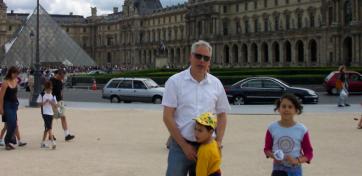 in front of the Louvre, Sara pulled a Blazer’s
cap from her backpack and commanded me to don it, having already put a cap on
Yehuda. I put it on with the
enthusiasm of a condemned man instructed to swallow cyanide.
But then, about 10 minutes into our ride, blending in as merely the
second most reviled object of French scorn -- the ugly American -- I saw three
handsome young Jewish men walking down the sidewalk in white shirts, black
pants, and velvet yarmulkes. I
turned to my wife, handed her the cap, and told her that if those boys had the
courage to walk like proud Jews with their heads held high in a city that once
provided gratuitous accommodations to Adolf Hitler (y’mach sh’mo), who was
I -- an American and an Israeli --
to cower under the pressure of 5 million Arabs? Knowing me better than I know
myself, Sara bit her tongue and slowly shoved the cap into her backpack.
in front of the Louvre, Sara pulled a Blazer’s
cap from her backpack and commanded me to don it, having already put a cap on
Yehuda. I put it on with the
enthusiasm of a condemned man instructed to swallow cyanide.
But then, about 10 minutes into our ride, blending in as merely the
second most reviled object of French scorn -- the ugly American -- I saw three
handsome young Jewish men walking down the sidewalk in white shirts, black
pants, and velvet yarmulkes. I
turned to my wife, handed her the cap, and told her that if those boys had the
courage to walk like proud Jews with their heads held high in a city that once
provided gratuitous accommodations to Adolf Hitler (y’mach sh’mo), who was
I -- an American and an Israeli --
to cower under the pressure of 5 million Arabs? Knowing me better than I know
myself, Sara bit her tongue and slowly shoved the cap into her backpack.
 The trip was pleasant enough. The splendor of the
"city of lights" stood out during a daytime tour of Paris up and
down the Seine. Everybody on the
The trip was pleasant enough. The splendor of the
"city of lights" stood out during a daytime tour of Paris up and
down the Seine. Everybody on the
 boat, including myself, was awestruck by the sheer
beauty of Paris. The day was 80°
and, unexpectedly, dozens of French Air Force jets paraded overhead in a
rehearsal for the upcoming Bastille Day.
I was jingoistically amused that one of the featured aircraft was an American-made
AWACS E-3 (Airborne Warning and Control System), a big radar depot made by
Boeing (not AirBus). Despite the
boat, including myself, was awestruck by the sheer
beauty of Paris. The day was 80°
and, unexpectedly, dozens of French Air Force jets paraded overhead in a
rehearsal for the upcoming Bastille Day.
I was jingoistically amused that one of the featured aircraft was an American-made
AWACS E-3 (Airborne Warning and Control System), a big radar depot made by
Boeing (not AirBus). Despite the
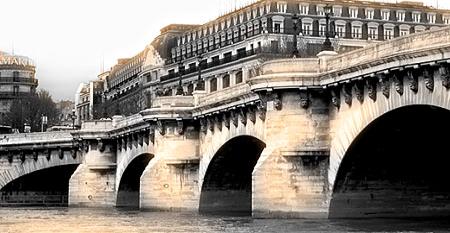 excitement of the air show and the glory of the
French riverfront, I may have been the only person on the boat considering the
reason Paris was so beautiful. How
was it possible that I could be floating down the river under a dozen bridges
that are more than 150 years old? How
was it possible that virtually every building, each breathtaking façade
predates 1940 -- from the Louvre to Notre Dame to a thousand fragile riverside
apartment buildings -- survived? Perhaps
the only one asking the question, I was keenly aware of the obvious answer.
Let’s just say, without being too mean-spirited, that the French seem
to have a penchant for acquiescing to the wishes of those who do not
necessarily have the best interests of my people at heart, whether it's October
15, 1894, June
14, 1940, or October
29, 2004. Let’s just say,
for example, that in Hungary not
a single bridge remained over the Danube (including in Budapest) in 1945
and that every last one of them was destroyed by the Nazis during their
retreat. But Paris, somehow
you cut a deal with the devil that left you unscarred.
excitement of the air show and the glory of the
French riverfront, I may have been the only person on the boat considering the
reason Paris was so beautiful. How
was it possible that I could be floating down the river under a dozen bridges
that are more than 150 years old? How
was it possible that virtually every building, each breathtaking façade
predates 1940 -- from the Louvre to Notre Dame to a thousand fragile riverside
apartment buildings -- survived? Perhaps
the only one asking the question, I was keenly aware of the obvious answer.
Let’s just say, without being too mean-spirited, that the French seem
to have a penchant for acquiescing to the wishes of those who do not
necessarily have the best interests of my people at heart, whether it's October
15, 1894, June
14, 1940, or October
29, 2004. Let’s just say,
for example, that in Hungary not
a single bridge remained over the Danube (including in Budapest) in 1945
and that every last one of them was destroyed by the Nazis during their
retreat. But Paris, somehow
you cut a deal with the devil that left you unscarred.
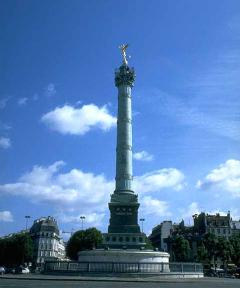


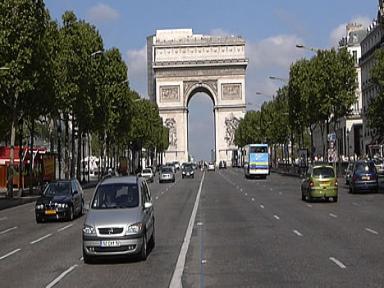
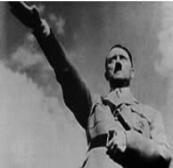 Two
days into the trip we found ourselves in a subway under the heart of Paris on
our way to the Champs Elysées, the same welcoming boulevard that accepted
thousands of victorious goose-stepping Nazis after they strolled unmolested
into France in June 1940. Same
street, same country. On the many occasions that I have met friends and family
at the Häagen-Dazs on that central thoroughfare, I have never shaken the
picture of the Führer standing atop the Arc de Triomphe that crowns this
overblown traffic hazard, this overbearing tourist trap, waving at the gleeful
Parisians. We -- Sara, children
and my mother-in-law -- were on our way to see the movie
"Madagascar" on the Champs, a stone's throw from with the Arc.
Two
days into the trip we found ourselves in a subway under the heart of Paris on
our way to the Champs Elysées, the same welcoming boulevard that accepted
thousands of victorious goose-stepping Nazis after they strolled unmolested
into France in June 1940. Same
street, same country. On the many occasions that I have met friends and family
at the Häagen-Dazs on that central thoroughfare, I have never shaken the
picture of the Führer standing atop the Arc de Triomphe that crowns this
overblown traffic hazard, this overbearing tourist trap, waving at the gleeful
Parisians. We -- Sara, children
and my mother-in-law -- were on our way to see the movie
"Madagascar" on the Champs, a stone's throw from with the Arc.
We
had traveled about four stops from my in-laws’ Metro station, with six to
go. Batya and I sat on the side
closest to the door with our backs
against it, one set of seats from the door.
Yehuda and Sara were on the
other
side of the aisle, and my mother-in-law was across from and facing them.
I was, of course, wearing my yarmulke, sans cap.
A
non-Arab, thirtyish Frenchman
entered the train. He had bushy
hair down past his shoulders 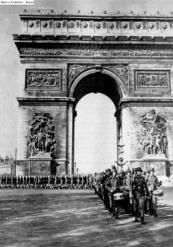 and
glasses so thick that he could have been declared sight-impaired.
I would not have
noticed him, being engrossed
in a conversation about math with Batya, had he not started yelling the moment
he boarded. I glanced up quickly, understanding virtually nothing he was
saying, and tried to distract Batya with the question of how many seconds
there are between subway stops if the subway stops at four stations every five
minutes. For a few stops the man
continued to yell and I paid no attention to him.
Batya, bless her heart, was caught up in contemplating the
answer to the subway question.
and
glasses so thick that he could have been declared sight-impaired.
I would not have
noticed him, being engrossed
in a conversation about math with Batya, had he not started yelling the moment
he boarded. I glanced up quickly, understanding virtually nothing he was
saying, and tried to distract Batya with the question of how many seconds
there are between subway stops if the subway stops at four stations every five
minutes. For a few stops the man
continued to yell and I paid no attention to him.
Batya, bless her heart, was caught up in contemplating the
answer to the subway question.
Eventually
the screamer noticed that we were speaking English. For the
next minute or so everyone endured a barrage of "F"-bombs and
"S"-bombs that would have made Eddie Murphy cringe.
I remember that the voice got louder.
I heard something to the effect of, "Do not ignore me," and
then I was struck from behind on the side of my head, apparently a downward
swipe. I immediately jumped up
and spun around. Moving forward toward the man, with at least 5 feet and a
half-dozen passengers between us, I leaned in and inquired in a booming voice,
which even frightened my children, whether he really wanted a piece of me.
Just as one might imagine 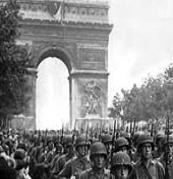 putting
his hand through a board before splitting it, I had no problem in that
split second visualizing that man's face as a
bloody mess on the floor of the subway, his glasses shattered, his mouth
silenced. I convinced myself in
that moment that this would not have been much of a contest and that this was
the right thing to do. The rubber was going to hit the road and I was more than
prepared to test my raging theory.
putting
his hand through a board before splitting it, I had no problem in that
split second visualizing that man's face as a
bloody mess on the floor of the subway, his glasses shattered, his mouth
silenced. I convinced myself in
that moment that this would not have been much of a contest and that this was
the right thing to do. The rubber was going to hit the road and I was more than
prepared to test my raging theory.
My
wife and mother-in-law, however, had quite the opposite opinion of what was
going to happen. Sara quickly
imposed herself in front of me and got into some sort of terse dialogue with
the man (who never understood that she was my wife).
All he wanted to know was why she would come to the defense of a Jew
and an American. At the same
time, even more impressively, my seventysomething mother-in-law, who has had
her share of health issues over the years, secured both her hands around my
bulging right bicep and yanked me off the train -- a good 2 yards -- with the
strength of a stallion. Before I
could inquire for the third time, "Do you really want to mess with
me?" I found myself off the train with Batya; mother-in-law, son, and
wife remained on the ride from hell.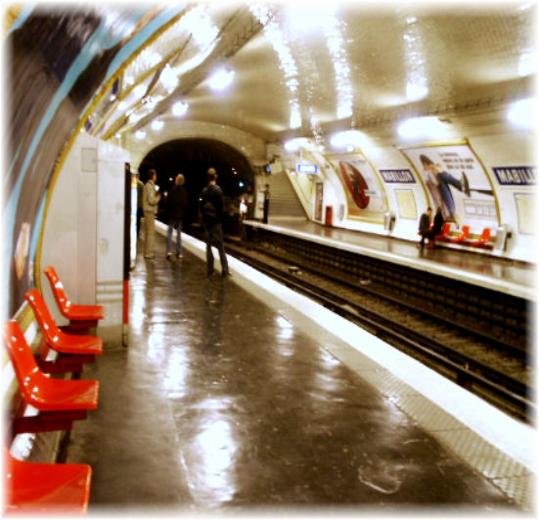
As
the train pulled away, I glared at my attacker, who was just as interested in
leering back at me, his face practically pressed against the glass of the
door. Then, as in some
too-fake-to-be-believed movie, this dude grinned as he brandished in front of
his face an object that was about 2 inches high, for me to think about.
I don't know if it was a knife or a cross, but I do know that it's
entirely possible that my Kung Fu theory was faulty and my mother-in-law had
just saved my life.
Batya
and I caught our breath and sat down to wait for the next train.
She was not sure what had transpired, but she was very afraid for me.
After I comforted her, two French high school boys approached us.
They had been on the train with us and had disembarked with us.
After huddling for a few moments, one of them in broken English shyly
apologized for the incident. Speaking
for his friend and himself (and all of France, he believed), the boy tried to
assure me the attacker was not representative of all Frenchmen. Seeing that they were more embarrassed and shaken than I was,
it did not seem the time to challenge his “not representative” assertion
by citing the general French population’s enthusiastic participation in such
hijinks as the Dreyfus Affair, French Nazi collaboration, and the current
French politicians' drive to appease their Arabs with unceasing
pro-Palestinian claptrap and policies. Instead,
I graciously nodded and told them I appreciated their sentiments.
A
minute later we were on the next train. I
assured Batya that the other three family members would be waiting for us at
the next stop, and not to worry her little head over it.
Sure enough, with great relief, all our eyes met as the train pulled up
to the next platform. We satisfied ourselves that we were okay, and I related to my
wife the conciliatory comments of the young men who were nearby.
She thanked them. I asked her why they did not get off the train when I did,
but she said it was too crowded from her side of the train.
(I also think that she wanted to give him a piece of he mind, which I
learned later, she did, and then some.) I
was then debriefed about the man's diatribe.
My wife later informed me that from the moment the man got on the train
he was screaming directly at me about Ariel Sharon and Israeli policies.
For five minutes we were all treated to a classic French barrage of
anti-Israel, anti-Semitic, and eventually anti-American drivel. Batya, added that attacker was yelling, "Kill you, kill
you, kill you" as we got off. I
must have missed that.
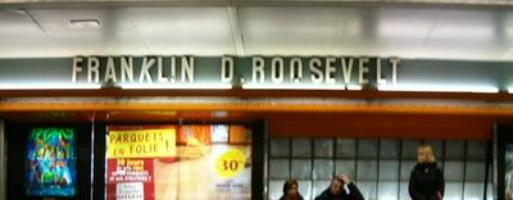 Before reaching our stop, a station so ironically
named that you would think I had concocted it for this chronicle -- the
"Franklin D. Roosevelt" station -- my wife jammed the cap in my face
and commanded me to wear it. I
informed her as gently as possible that the last thing I was going to do as an
Israeli and American, after being attacked as a Jew and American in that
anti-Semitic cesspool called France in 2005, 60 years after the Holocaust, was
hide my yarmulke. She knew better
than to fight; she knew whom she had married.
Before reaching our stop, a station so ironically
named that you would think I had concocted it for this chronicle -- the
"Franklin D. Roosevelt" station -- my wife jammed the cap in my face
and commanded me to wear it. I
informed her as gently as possible that the last thing I was going to do as an
Israeli and American, after being attacked as a Jew and American in that
anti-Semitic cesspool called France in 2005, 60 years after the Holocaust, was
hide my yarmulke. She knew better
than to fight; she knew whom she had married.
We
all spent the rest of the day (even while watching "Madagascar" with
horrific French overdubs) replaying the attack.
My
wife's family’s basic reaction was that I was a fool for going out without a
disguising cap. The only
exception was one of my father-in-law's sisters, who, when she saw me again
refuse to put on a cap, praised me for my "convictions."
The
dearest people in my life, after my wife and children and siblings, are my
in-laws. I have come to know them
well, spending about three months a year (over the past 10 years) with them as
guests in our home. They are
generous and loving and caring and supportive.
No success has occurred in my life since I met them that they have not
encouraged; I have had no moral or financial difficulty of which they been
aware and not been pained about and tried to solve.
One small example of their devotion to me is that when I fly alone to
America they wait by their phone for my wife’s call informing them that I
have arrived safely. Yet I watch
these people, who saw their Tunisian city and homes blown to bits during World
War II, and who uprooted their family to start over in France, emotionally
torn apart by the notion of emigrating. They
know it is the right thing to do, as exemplified by their oldest
granddaughter, Carole, who was officially making aliyah the very week that we
returned home from this summer’s trip.
But they toil with the quandary of what to do with five other
grandchildren and a host of their own siblings who depend upon them in France.
Their shame over what happened to me in the subway was far more painful
than anything I felt, yet they feel they cannot leave.
Each
of our lives is a study of contrasts and ironies. We can only pray for a return to Zion. Ideally, our return will not be on the back of terror or
persecution. But my prime
minister was correct, and hopefully -- whether in America or France -- those
who need a kick in the rear to come home will not have to be pushed over the
edge by a blow to the head.